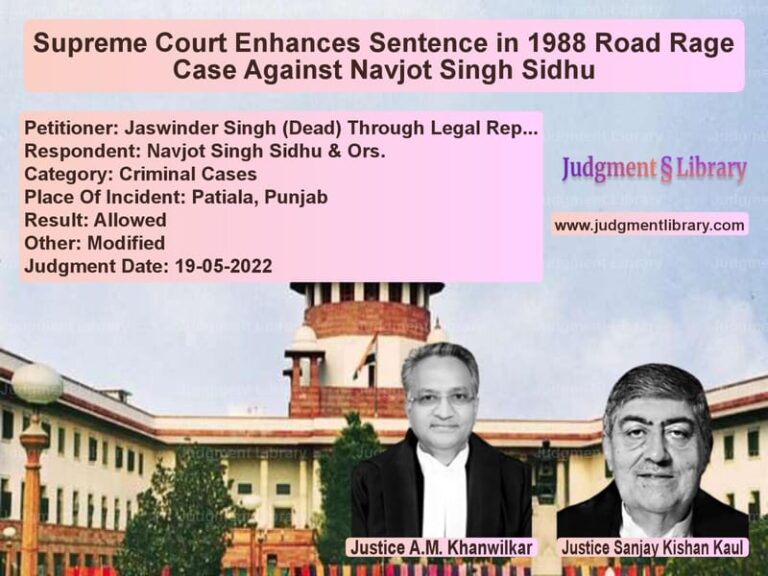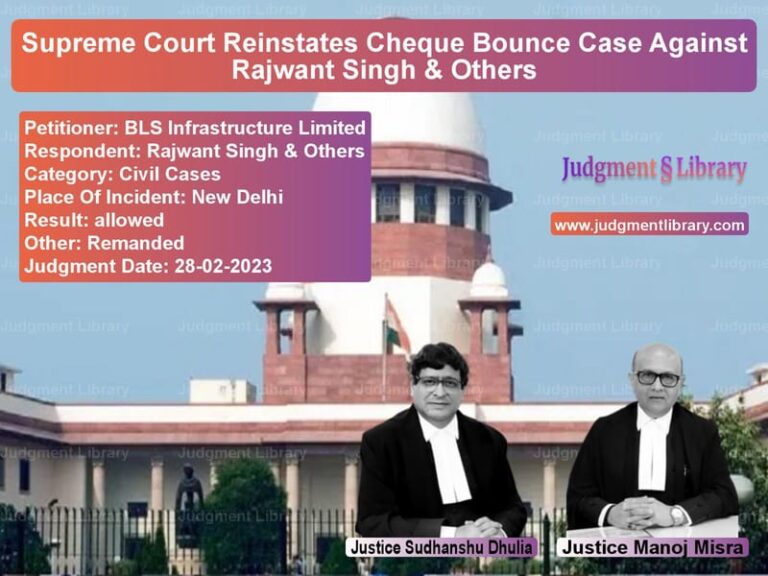Regulation of School Fees in Rajasthan: Supreme Court Upholds State’s Authority
The Supreme Court of India recently delivered a landmark judgment in the case of Indian School, Jodhpur & Anr. v. State of Rajasthan & Ors., where the validity of the Rajasthan Schools (Regulation of Fee) Act, 2016 was challenged. This case involved multiple private unaided schools that contended that the Act and its Rules infringed on their fundamental right under Article 19(1)(g) of the Indian Constitution, which guarantees the freedom to practice any profession, or to carry on any occupation, trade, or business.
The judgment has significant implications for the regulation of school fees in the state of Rajasthan, as well as for private educational institutions across India. The case brought to the forefront key issues concerning the autonomy of private schools in determining their fee structures and the extent to which the state government can regulate these fees to prevent profiteering and commercialization of education.
Background of the Case
The Rajasthan Schools (Regulation of Fee) Act, 2016 was enacted to ensure that private unaided schools do not charge excessive fees from students and to regulate the fixation of fees. The Act provided for the constitution of School Level Fee Committees (SLFCs) and Divisional Fee Regulatory Committees (DFRCs) to oversee the process of fee determination. Several private unaided schools challenged the Act, arguing that it curbed their autonomy and was unconstitutional.
Arguments of the Petitioners
The petitioners, which included the managements of private unaided schools in Rajasthan, raised the following key arguments:
- The Act and the Rules framed under it violated their fundamental right to carry on the occupation of imparting education, which includes the autonomy to determine school fees.
- The composition of the SLFC, which included five parents and three teachers along with only one representative from the school management, led to a loss of control for the management in deciding fees.
- Parents with children receiving free education under the Right of Children to Free and Compulsory Education (RTE) Act, 2009 could become part of the SLFC and influence fee decisions despite having no financial stake in the matter.
- The provisions of the Act imposed arbitrary and excessive restrictions on private unaided schools, making them subject to undue scrutiny and interference by state authorities.
- The State Government did not have the authority to regulate the fees of private schools beyond preventing profiteering and capitation fees.
Arguments of the Respondents
The State of Rajasthan defended the legislation, making the following arguments:
- The Act was a regulatory measure and did not take away the autonomy of private schools; it merely ensured that fee structures remained reasonable and in the best interests of students and parents.
- The composition of the SLFC was designed to ensure the participation of all stakeholders, making the decision-making process more democratic.
- The fee determination process was not arbitrary, as it was based on clear factors outlined in Section 8 of the Act, such as infrastructure, salaries of staff, and reasonable revenue surplus for development.
- The Supreme Court, in earlier cases like T.M.A. Pai Foundation v. State of Karnataka and P.A. Inamdar v. State of Maharashtra, had recognized that regulatory mechanisms were permissible as long as they did not infringe on the autonomy of private institutions.
Supreme Court’s Ruling
The Supreme Court, in its judgment, upheld the validity of the Rajasthan Schools (Regulation of Fee) Act, 2016 and its Rules, making the following key observations:
- While private unaided schools have the right to determine their fees, this right is subject to reasonable restrictions to prevent profiteering and exploitation of parents.
- The regulatory framework established by the Act was consistent with past Supreme Court rulings that allowed for oversight to prevent commercialization of education.
- The SLFC and DFRC mechanisms provided adequate safeguards to ensure that schools could propose their fee structures while allowing oversight to prevent arbitrary hikes.
- The Act did not violate Article 19(1)(g) of the Constitution as the restrictions imposed were reasonable and in the public interest.
Conclusion
The judgment reinforces the power of state governments to regulate school fees in private unaided institutions to ensure fairness and transparency. This ruling sets an important precedent for other states that may consider implementing similar regulations.
Read also: https://judgmentlibrary.com/electricity-load-reduction-dispute-jharkhand-high-court-verdict-upheld/
The decision strikes a balance between the autonomy of private educational institutions and the need for state oversight to protect students and parents from excessive fees. Private schools must now comply with the regulations under the Rajasthan Schools (Regulation of Fee) Act, 2016, ensuring that education remains accessible and affordable without undue commercialization.
Petitioner Name: Indian School, Jodhpur & Anr..Respondent Name: State of Rajasthan & Ors..Judgment By: Justice A.M. Khanwilkar.Place Of Incident: Rajasthan.Judgment Date: 03-05-2021.
Don’t miss out on the full details! Download the complete judgment in PDF format below and gain valuable insights instantly!
Download Judgment: indian-school,-jodhp-vs-state-of-rajasthan-&-supreme-court-of-india-judgment-dated-03-05-2021.pdf
Directly Download Judgment: Directly download this Judgment
See all petitions in Consumer Rights
See all petitions in Education Related Cases
See all petitions in Judgment by A M Khanwilkar
See all petitions in dismissed
See all petitions in supreme court of India judgments May 2021
See all petitions in 2021 judgments
See all posts in Civil Cases Category
See all allowed petitions in Civil Cases Category
See all Dismissed petitions in Civil Cases Category
See all partially allowed petitions in Civil Cases Category







